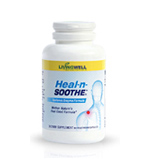By Steve Hefferon, CMT, PTA and co-founder of LoseTheBackPain.com
An Anti-Inflammatory Diet Could Be the Ticket to Feeling Better
When I say the word “inflammation,” it’s likely to evoke thoughts of painful joints and muscles, swelling, and a loss of mobility. But did you know that recent research shows that chronic inflammation in your body can lead to serious diseases such as diabetes, heart disease, some cancers, and Alzheimer’s disease, to name just a few?
The amount of inflammation in your body varies and is dependent on a number of factors – including your activity level, the amount of sleep you get, the degree of stress in your life, and even the foods you eat. What you have to realize is that these factors are cumulative – meaning they build up over time. And the more that any or all of these factors get out of whack, the risk for disease increases.
Early in life, these levels can be so low that you might not even be aware that you have any inflammation in your body. That’s because our bodies do a fairly decent job of controlling the inflammation – at least for a while. Then one day you wake up and you’re in your 40s and something is just not right. That’s when the fear begins to set in, and you think to yourself: What did I do wrong? or What can I do now to help myself?
The first step is to get your C-reactive protein (CRP) levels tested. C-reactive protein is produced by the liver, and the level of CRP rises when there is systemic inflammation in the body. Ask your doctor about this (you may have to demand to have the test done). All it requires is a blood sample that will be evaluated by your doctor. And because diet can play a large role in how much or how little inflammation you have, you may want these levels looked at by a registered dietician who can help you formulate an appropriate eating plan.
If you have pain due to inflammation, you may choose to take the traditional medical path, which includes non-steroidal anti-inflammatory drugs (NSAIDs), steroids, and even joint-replacement surgery in extreme cases. The good news is that there are natural ways to fight inflammation without the undesirable side-effects that often result from the treatments listed above.
What You Eat Makes All The Difference
The food we eat is a critical piece of the puzzle when it comes to controlling inflammation. The typical American diet consists of too much fat, tons of sugar, loads of red meat, and a frightening amount of processed foods – all of which are likely to increase inflammation and contribute to obesity, which itself is can cause inflammation. By switching to an anti-inflammatory diet plan consisting of healthy whole foods, you can actually decrease inflammation and ease the pain and discomfort associated with it.
The first step is to avoid processed foods, foods high in sugar, and junk food whenever possible. Instead, choose fresh whole foods, especially anti-inflammatory varieties such as lean proteins, fruits, and vegetables. But choose carefully. Many vegetables and pre-packaged “health” foods can actually work against you. Use this handy list of the best and worst foods for controlling inflammation:
Alaskan Salmon (wild)
Fresh whole fruits, vegetables
Bright multi-colored vegetables
Green tea
Water
Olive oil
Lean poultry
Nuts, legumes and seeds
Dark green leafy vegetables
Old fashioned oatmeal
Spices, especially Turmeric and Ginger
Sugar, from any source
Processed foods
French Fries
Fast Foods
White bread
Pasta
Ice Cream
Cheddar Cheeses
Snack Foods
Oils such as vegetable and corn
Soda, caffeine and alcohol
In addition to these dietary changes it is also recommended that you:
* Maintain a healthy weight – There is no question that eating healthy is not easy nowadays, whether you’re at home or at a restaurant. But at the very least, you must try to decrease your intake of sugars and hydrogenated oils and increase your daily intake of fiber. Ideally, you should be consuming 35 grams of fiber (that is a ton of fiber, but it’s worth shooting for).
* Get better sleep – 7 to 9 hours of sleep is a must for optimal health; getting a good night’s sleep is key to controlling systemic inflammation.
* Relax more often to lower stress levels – Find time for yourself throughout the day to focus on your breathing and clear the clutter from your mind; learn to stay focused on the most important tasks in your life.
* Exercise on a regular basis – People always ask me: What’s the best exercise to do? I always tell them: Do something you like to do and, if your body can tolerate it, aim for 15-20 minutes three times a week.
* Demand to have you CRP levels tested – This simple blood test is the best indicator of the amount of systemic inflammation in your body. Have the levels evaluated by a certified health care provider who can suggest the most appropriate action.
So, if you are in pain and you’ve made a conscious decision to help yourself get better, then…
Featured Product:

Heal-n-Soothe™ – Pain Relief Through Enzyme Treatment
Here’s What People are Saying About Heal-n-Soothe™….
“I experienced wonderful relief from my pain the very first day I used your system. It worked so well I told some friends about it and they too have gotten relief. I’ve had back pain for 20 years and now it’s gone… it’s amazing!”
Robert English – Queensland, Australia


